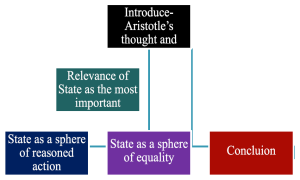Ques. “The public sphere can function only where there is equality.” Comment.
Answer

- According to Aristotle, the human community is a complex inter-relationship of three different kinds of communities, the simplest of them evolving teleologically into the more complex.
- Family/household as primary social unit
- Villages as a group of families/households
- State/Polis comprising a number of villages
- Aristotle notes that human beings are above all social animals, and so naturally political animals as well. Therefore, Nelson argues the State becomes teleologically prior to other units, even though historically it emerges later.
- There are two further reasons which make the Polis the most important organisation for Aristotle:
- Firstly, Aristotle argues that State is able to inculcate virtue in its citizenry to a greater degree than the household or village because it allows for the expression of reasoned action to a greater degree. Free choice and reason is limited in subordinate communities because of emphasis on maintaining biological necessities of labour, procreation etc.
- Secondly and more importantly, unlike subordinate communities where the relationships are hierarchical in nature- householder vis-à-vis children/wives and master vis-à-vis slaves, state is based on equality of relationship amongst all its citizens/ members.
- Thus, for Aristotle, state must be ruled constitutionally, which means that the whole citizenry must in some way participate in an equality of rulership, whereas the inequality of the household demands the rule of one person. This same idea of equality of public sphere leading to political action was re-emphasized by Arendt in her thought.
- This equal participation of citizens in decision making in the State becomes possible because of free speech, which is regarded as the foremost political virtue by Aristotle (later emphasised by Arendt as well).
- The free speech is a means of relaying reasoned arguments available to free and equal citizens with one another that enables emergence of a public sphere. However, this idea of equal citizenship of Aristotle is criticised for being inherently elitist.
- Anupama Roy in her analysis points out that not everyone could share in the civic life. Citizenship was confined to free, native-born men and excluded women, children, infirm, slaves and resident aliens.
- Feminists like Okin have been critical of the Public/Private dividewhere the public/political sphere as the realm of liberty and equality for free, male citizens while the private sphere is inherently unequal.



